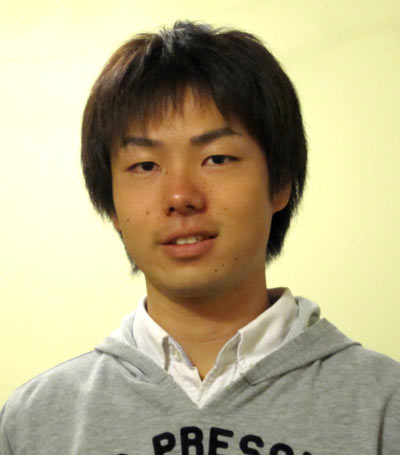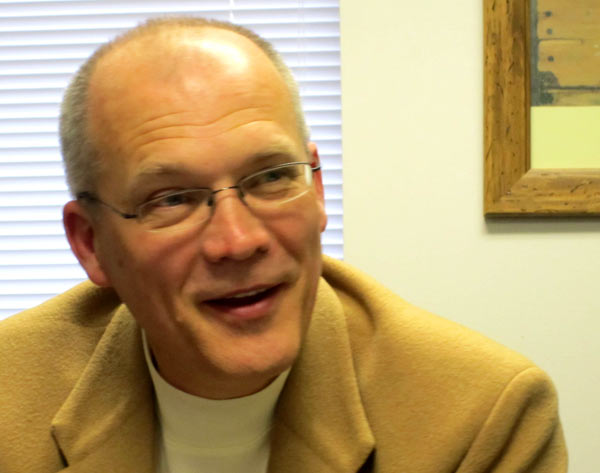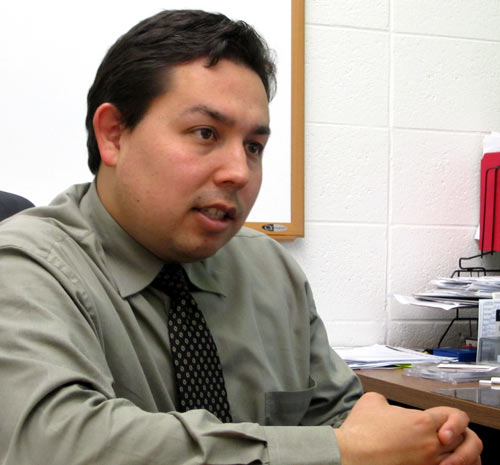Japan still epicenter of students’ attention as America’s interest wanes
April 8th, 2011 Posted in OpinionStory & Photos by Shirrel Cooper
LOGAN—Kosuke Nakamura can feel interest is waning. He can see it when he collects donations. It’s apparent when he watches the news.
But for this Utah State freshman who is majoring in agricultural business, the catastrophic March 11 earthquake and tsunami in Japan is something he can’t forget.
 “The problems haven’t stopped yet,” Nakamura said. “There are still some earthquakes. And many people are suffering from the damage of the big earthquake still.”
“The problems haven’t stopped yet,” Nakamura said. “There are still some earthquakes. And many people are suffering from the damage of the big earthquake still.”
In fact, Japan was rocked by another 7.1 magnitude earthquake this week, further terrorizing a stricken nation.
Nakamura came to USU from his home in Yokohama, Japan, last fall. While the majority of USU students seem to have forgotten about the destruction overseas that has paralyzed his country, Nakamura knows that most of Japan is still buried—literally and otherwise.
“There are so many people still [struggling] now,” Nakamura said. “There are still earthquakes, so people look for evacuation shelters where they can get food and water and blankets at the earthquake points, from other prefectures and from foreign countries.”
Nakamura had just returned from spring break in Mexico a month ago when he heard about the 8.9 magnitude earthquake that had struck Japan, and the huge tsunami that followed. While his family does not live in the Miyagi prefecture, where the quake was centered, his dad was working in Sendai, near the epicenter, when the earthquake struck.
“My father was accidentally in Sendai—you know, it’s the central of the earthquake point—for work, but he was really lucky,” he said. “He works at Volkswagen, the car company, and he was in the showroom.
“The showroom was really safe because there were pillars, many pillars in the showroom, so it was kind of stronger than other buildings, so he was safe, so he could survive.”
Nakamura said that his father spent the night after the quake in a hospital parking lot before being able to return home the next day.
“He was lucky so he got water and some food from the hospital, and the next day, he came back to Tokyo using a car,” Nakamura said. “The highway was not working, so they used local roads. Usually it takes just six hours, but they took 15 hours. And there was a long line to get gasoline.”
Nakamura’s family and many of his friends are still in Japan, and although he knows they are fine, he also knows that Japan still needs help to recover.
“The mass communication, like the news, focuses on the impact on markets and financial aspects,” Nakamura said. “So I think it’s a little bit sad that there are so many people dead in Japan, it’s not a matter of finance or market. It’s a matter of human beings, human life.”
More than 7,100 people have been confirmed dead after the March 11 earthquake and tsunami, and as many as 12,000 people are still missing. The second 7.1 tremor on Thursday, located near the first epicenter, killed three people and injured 130, according to news reports.
USU student Gary Perry is in Japan, and he is also frustrated that interest in the Japan disaster is waning. A student in USU’s study abroad program, Perry has been in Gifu, a landlocked prefecture, or state, in the middle of Japan, since October, and has watched the catastrophe play out.
“I remember watching on the news here in Japan as the official death count climbed from five, ten, 20, 100, 200, 1,500, 10,000, and now possibly close to 30,000,” Perry said via email. “Many people have lost their homes, and the northern areas of Japan have been dealing with freezing temperatures, rain, and loss of electricity. On top of this there are food and water shortages and many cannot get ahold of basic supplies. The damage done to the northern areas near Fukushima and Sendai is staggering. And it seems to me that news of the ongoing nuclear crisis has overshadowed the ongoing earthquake and tsunami crisis.”
Perry, who plans to remain in Japan until his study abroad is over, has been surprised at how the Japanese have handed the disaster.
“I have been very surprised by the calm nature in which the Japanese people are confronting the disaster,” Perry said. “Even in the hardest hit northern areas of Japan, where food and water has become short in supply, I have heard no reports of any fights or violence.”
 Kenneth Snyder, executive dean of the Huntsman College of Business, attributes this to Japanese nature.
Kenneth Snyder, executive dean of the Huntsman College of Business, attributes this to Japanese nature.
“I can’t imagine any scenario of anything that would ever happen in Japan that would make a Japanese person loot,” Snyder said. “It’s beyond their thought processes. It’s not even part of their mindset.”
Snyder, who lived in Japan for four years, was leading a group of 16 students and two faculty members on a MBA business study tour when the earthquake and tsunami struck. Snyder and the students were in Kyoto, Japan, about 230 miles from Toyko and 370 miles from Sendai, when the earthquake hit.
“The students had asked, ‘Are we going to feel an earthquake when we’re in Japan?’” Snyder said. When the earthquake happened, “we kind of stopped when we were talking, people were starting to look around, and I went, ‘OK, guys. That’s an earthquake. This is an earthquake. You can feel the movement. Now you can say, ‘I’ve been in an earthquake.’ So we kind of made a joke about it.”
It wasn’t until after that Snyder realized the small quake they had felt was actually part of such a huge event in the northern part of Japan.
“We didn’t know until like an hour-and-a-half later,” Snyder said. “We get back to the hotel and see that it was a 9.0 quake that was 600 miles away that we felt. And then I saw where the epicenter was and I went, ‘Oh no, there’s going to be a tsunami,’ and they hadn’t had any reports on the impact or anything, but a 9.0 quake out at sea is sure to bring a tsunami. And from that point on, we were glued to the TV.”
Snyder said that because they were so far away, the earthquake didn’t really affect them. All of the students were able to contact their families after the earthquake and all were able to leave Japan as scheduled.
Joseph Banks, the Huntsman internship coordinator and one of the faculty members who traveled with the study group, said the students were shook up after the earthquake.
 “The students, I think they handled it really well. They were shaken, to say the least,” Banks said. “We had parents, family, wives, and everyone, spouses calling, trying to see if they were all right. We had to communicate with our emergency contacts here at the school so that they could communicate with their family. A lot of the students were able to use Facebook to communicate very quickly to all their friends and family saying that they were OK.”
“The students, I think they handled it really well. They were shaken, to say the least,” Banks said. “We had parents, family, wives, and everyone, spouses calling, trying to see if they were all right. We had to communicate with our emergency contacts here at the school so that they could communicate with their family. A lot of the students were able to use Facebook to communicate very quickly to all their friends and family saying that they were OK.”
Brittany Ford, an senior liberal arts major, who was in Japan for her senior year, knows what it is like to have concerned family members. After the earthquake and tsunami, her family asked her to come home because of the radiation threat from the crippled Fukushima nuclear power plants that are leaking radioactive air and water.
“I didn’t think that I would be one of the ones to leave. I felt no threat in Osaka,” which is 250 miles south of Tokyo, Ford said. “We were reassured that we were safe in the event of an earthquake or tsunami. It was the nuclear threat that my family worried about and I left the day they asked me to leave.”
Ford is forced to wait before she can return to Japan.
“While I plan to return when the situation has stabilized, I am faced with uncertainty right now. The nuclear plant continues to be volatile and no one knows when it will be under control,” Ford said. “I may be forced to drop the program and repeat my final semester before I can graduate.”
Because the problems in Japan are still so much a part of Ford’s life, she finds it hard to believe that people in the United States have started to forget about the disaster.
“It’s hard for me to imagine that people are forgetting so quickly,” Ford said. “It’s so much a part of my life and of the lives of those who are struggling to piece back their lives after everything was swept away by this disaster.”
But she says she can understand why Japan is being forgotten. For most people in the United States, what happened in Japan was a world away. But she said that there are people here who have been affected, and who are still being affected, by the earthquake.
“For some of us at USU, this is about home,” Ford said. “I’m sure many of the Japanese students who are studying abroad and our Japanese teachers were affected. We should definitely support them and show that we care.”
Tysen Maughan, a senior international business and economics major living in Kobe, Japan, blames the large number of disastrous events worldwide for waning attention to Japan. Over the past month, upheaval in the Middle East and northern Africa and other events have diverted attention from the aftermath of the Japan earthquake.
“Unfortunately, we’ve all become kind of numb to things like this because of all the stuff we see on the news on a daily basis,” Maughan said via email. “I think we just have to keep reminding people that there is still a lot of suffering going on here and there is a lot that can be done.”
Living in Kobe, Maughan says that while he hasn’t really been affected by the earthquake, many other students have.
“Luckily for me, USU has been extremely helpful and understanding about the situation; even offering to pay for plane tickets had I decided to return the U.S.,” Maughan said. “Unfortunately some of my international friends haven’t been so lucky. Some of their universities have forced them to return home even though we’re about 400 miles away from the nuclear- and tsunami-affected areas.
“In fact, in this area, other than being able to give money to organizations for disaster relief, we aren’t capable of doing a whole lot, as it is still almost impossible to get to the [disaster] areas from here,” he said.
Theo Perigo was in Tokyo when the earthquake hit but left about a week later. He says people need to keep being reminded about the disaster until it is cleaned up.
We need to keep “letting people know that even though the big earthquake is over, things such as the cleanup and rebuilding of cities and peoples’ lives will probably take months, if not years to complete,” Perigo said. “There really isn’t much people in America (can do) besides donating and pleading (with) the world that Japan needs help.”
Perigo, a sophomore international studies major, plans to return to Japan to finish spring semester and possibly help the Japanese people.
“If possible I would like to help out in Japan, anyway I can,” Perigo said. “However, things are still up in the air over there so I can only wait and try my best to just continue my life as normal. I have loved my experience in Japan. So far, I’ve met so many great people and experienced so many new things.”
When Nakamura returns to his home in Japan at the end of this school year, he will face a very different country than when he left. Because he is in Utah, all he can do is help from a distance. Since the disaster, he has been trying to raise money.
“I think Japan needs, now, youth power. Young people like me,” Nakamura said. “But I couldn’t do anything in Japan, so I felt helplessness. Yeah, it was frustrating. But now Japanese people gathered and talked about earthquake, and we want to do something for Japan, so we started collecting donations.”
Although interest seems to be waning, Nakamura said that those who know him still care about his story and remain interested in how he is handling the disaster.
“The students and the teachers around me care about my friends and my family,” Nakamura said, “and they focus on people, on human life. It makes me really glad.”
TP
Tags: Huntsman College of Business, Japan earthquake, relief effort, tsunami

Sorry, comments for this entry are closed at this time.